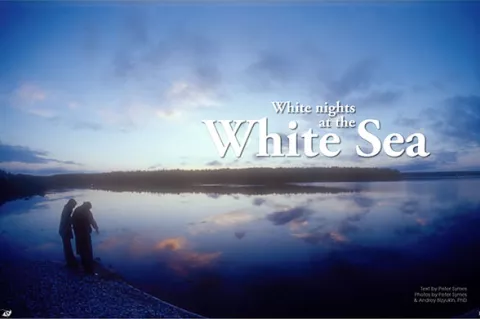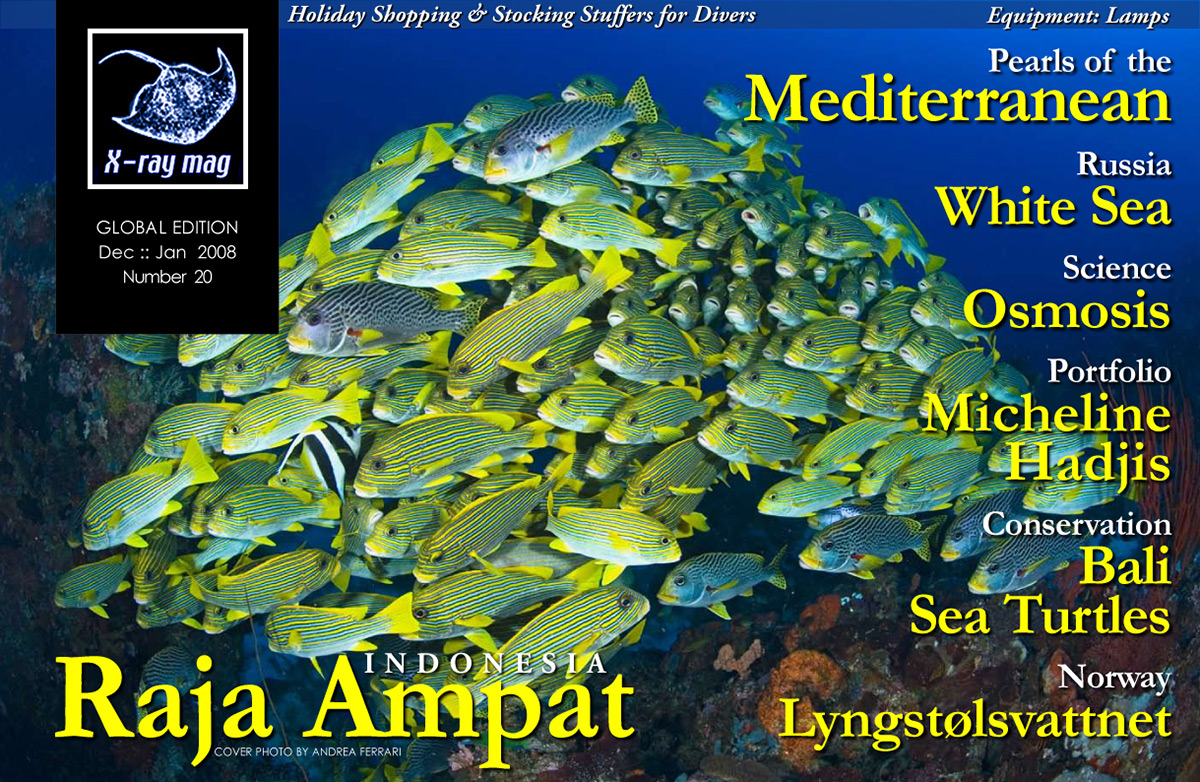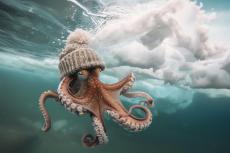Russia. I am here. I am gripped by a sense of disbelief. As the tundra flies past the train window recollections of grainy tv-images from my childhood keep popping up. The marching soldiers and missile batteries being paraded across the red square before the pouty looking Leonid Breshnev and the politbureau looking on from the top of Lenin’s mausoleum. That was scary days. The Iron curtain was impenetrable and Russia was a place only for spies and covert business men and diplomats. That is what it felt like anyway. So here I am, sipping tea in a old, but very confortable sleeper wagon heading up north from Sct. Petersburg towards the artic circle and some spectacular diving during the long days.
Contributed by
The train is very comfortable and provides a rare low-stress environment where you can do nothing than chill out, perhaps stretch across your generously wide berth and read a novel while the red-star adorned locomotive pulls you steadily northbound across the endless expanses of wilderness.
Going north
After a couple of days of much commendable sightseeing in Sct. Petersburg – one of the most beautiful cities in the world, and home to an incredible collection of art – we had ample time to check out of our hotel and leisurely catch our train around noon. It is a 26 hr ride north and with an arrival time at the tiny whistle stop of Chupa, a small dispersed urbanisation some 40kms south of the artic circle you need not worry about oversleeping either. Meals onboard are sturdy but that is part of the real experience.
In hindsight the train ride was just as memorable and a highlight like St. Petersburg and the diving that awaited us ahead.
Getting off the train, we were struck by the fresh crispness of the air that characterises the high north – you just had to inhale deeply - and as the train leaves and you listed to it disappearing in the distance it gets really quiet. The kind of quietness that just transplants itself into your mind. Soon, some non-descript ex-military four wheel drive vehicle that looked like a hybrid between an Asian minibus and a ww2 amphibious landing craft screeched up on the scene. Our ride to the dive resort had arrived.
A Spanish galleon?
40kms out of dirt roads later we got a “Close encounter of the Third Degree” experience as something that looked like a yellow Spanish Galleon appeared behind the spruces in the wilderness. But that, Ladies and Gentlemen, should soon turn out to be the artistic superstructure of the dive center and our abode for the next week.
To this day I have never been able to make up my mind whether this construction was silly, childish, funny, remarkable, daring or plainly just an eyesore. But it was surprisingly functional and roomy inside. Very nice rooms, good dining facilities and great view from the upper deck, lots of storage and changing room downstairs, effective drying facilities and, off course, the indispensable sauna.
Diving
40kms out of dirt roads later we got a “Close encounter of the Third Degree” experience as something that looked like a yellow Spanish Galleon appeared behind the spruces in the wilderness. But that, Ladies and Gentlemen, should soon turn out to be the artistic superstructure of the dive center and our abode for the next week.
To this day I have never been able to make up my mind whether this construction was silly, childish, funny, remarkable, daring or plainly just an eyesore. But it was surprisingly functional and roomy inside. Very nice rooms, good dining facilities and great view from the upper deck, lots of storage and changing room downstairs, effective drying facilities and, off course, the indispensable sauna.
Diving
The thing we came to do. The dive centre sits right by a little shallow bay or inlet, which constitutes a sort of ..uhm… housereef. Only is there no corals here, at least not in the shallows, but a lush vegetation of kelp in which numerous species of nudibranchs crawl about. I could spend hours – until I was called out of the water as dinner was to be served – just watching the critter spectacle going on under the leaves of the kelp.
There was a little headland in front of the divecenter with a drop-off permitting some deeper diving. The water was flat and still and the sky was just magnificent – at these high latitudes it is just soft and have a lot of tones. As we were sitting for a while in the surface before submerging it was so tranquil that we could hear each other breathing. The water is clear and cool.
At first I can’t see a thing as I marvelled a bit too long at the bright sky before going down but soon I see the bushes of lightly coloured softcorals all over the mulch coloured and textured bottom. It is like a garden down here, not unlike the tropics in a sense, only is the colour schemes reversed. The corals are bright and the bottom dark. And oh… it is pretty cold under the thermocline and crystal clear.
But who’s affected by the temperature, we are not diving in skins up here. Bring a thick wetsuit, or better still, a drysuit which is much more comfortable anyway. Andrey and I hover around some of these magnificent installations, being careful not to kick up too much sediment.
Not only are we trying not to destroy the visibility but the kicking up particles are not good for the coral either. They are filter feeders and catch their food by sifting through the water. Would you like to get a handful of gravel thrown in your plate of ravioli with parmesan? I guess not, so be considerate around soft corals.
Things are kept straightforward and basic up here. Meals are not five star gourmet cuisine but they are good, solid and genuine. And there is plenty of it and more where it came from. The samovar is constantly brewing tea and with a piece of candy or cookies you soon make yourself very comfortable after a meal either with a good book or more likely with a conversation into the long bright evenings. You are so blissfully disconnected up here.
No TeeVee, no emails, no cell phone connection, no nada. Just you and the grand wilderness outside. I asked Yurij, the director of the dive centre whether they had internet – via interpreter as he didn’t speak English and my Russian was less than rudimentary but he gave me this look, pointed to the sky and said ‘Sputnik’ followed by the international handsign for “pricey”. Who needs it anyway.
The next day we sail out the narrow fjord on the dive boat. It is, obviously, some former fishing vessels that has been transformed into absolutely decent dive platform with a roomy aft deck. It ain’t fancy but it gets the job done. Where the fjord meets the White Sea proper there is a little archipelago into which we soon weave in and out between the spruce, birch and fyr draped islets.
We anchor in another sheltered cove nearby a drop-off that leads to a cavern. The visibility is less good today but once you break through and get under the thermo-cline it get clears as usual – and dark and cool. It is like a netherworld with an almost Gothic atmosphere.
But otherwise the diving is easy as I haven’t encountered any current or wave action. If you can deal with being cocooned in a puffy drysuit to keep you warm for the duration this place is very pleasant and exciting to visit. I swim slowly forward along the cliff and then I see it. A giant gaping black hole into the rock – and it is draped by some of the most intense coral festoons hanging down from the overhang.
I carefully swim closer to take a closer look. It is not always easy to look upwards in a drysuit without incidentally letting some air out of some cuff or valve – or worse, also let is a squirt of cold water along the neck seal as you stretch to turn your head. I hate when that happens. It is as bad as stepping into cold water in a bathroom soaking your warm comfy socks on a cold winter morning.
But for now I manage to gently hover around like a levitating monk, without touching anything precious and fragile. The images speaks for themselves.
Fodder
Lunch is made local style. We anchor in a little cove, where the skipper makes a camp fire. Here he boils freshly caught blue mussels, fish and some mushroom. They also have some, rather smelly, smoked fish of an indeterminate species on offer which among our Russian friends seem to be a great delicacy.
The squeamish Westerners had no hesitation in giving it a pass, but the mussels which were served with a little bit of butter and garlic were just irresistible. And so was the strong tea with lots of sugar that I have come to favour. After lunch we went for a little leg-stretcher along the coastline.
There were lots of flowers, mushrooms and delicious sweet blueberries which we eagerly collected along the way. And then we came past some dung, that looked like the pellets that rabbit or deer leave behind, only supersized. We were puzzled but upon our return to camp we were told that what we have come across was a brown bear’s ‘business card’. Glad that I didn’t know that when I ventured into the wilderness.
Night dives are hard to come by at this time of year. Being close to the arctic circle around midsummer means that there is virtually daylight round the clock. The sun barely dips below the horizon. But you can have some awesome evening dives in the almost perpetual twilight. In the dense kelp forests in the shallows there is plenty of nudibranchs, shrimps, shellfish, anemonae and small fish with ogling sculpins being omnipresent. And a hot cop of tea with ginger cookies is never far away.
Close by the centre, only minutes of sailing time away, there is a wreck of a small fishing vessel. It lies close to a cliff so this is another site where you can anchor along the coast and dive from the shore. The wreck isn’t the greatest but it there and decent and adds to the diversity of dive sites in the area.
There is also a submerged mine close by that can be dived. I didn’t go but our good colleague Andrey, who is a die hard cave diving affectionado, couldn’t help himself, of course, and off he went one early morning while we are still sipping our morning coffee only to return later in the day with a happy-elated expression smeared all over his grinning face. I didn’t even bother to ask him if it was good.
At the end of the fjord, at a strategic position, there is a marine research station which belongs to one of the faculties under St. Petersburg University. Here we are greeted by professor Victor Berger who give us a tour of the facilities and explains the geography and ecology of the region. We are struck by how dilapidated and run down the facilities are. Under-funding in science and scientists struggling to make ends meet seem to be a global ailment but the Russians are better than any to do great science on a shoestring. Necessity is the mother of invention.
Out here we have another couple of dives between the islets.
On the way back we come by a group of cheerful seals playing in the surface. Every day we see something new. On occasions the white whales also pay the inlet a visit, but we were not that lucky.
Back at Nereis someone has fired up the sauna. It has been a long day and the evenings can be cool so that is a very welcome diversion after the trip back along the fjord. And, oh yes, they do the whole thing, even throwing some vodka on the coals. Not that it did much other than add a little scent of juniper but in this country vodka comes cheaper than bottled spring water.
After 20mins in the sauna my tensions are melted away and with knees that feel like rubber I stagger out to get dressed before having a late supper. That evening I feel asleep before my head hit the pillow.
Every morning the cook produces a very generous stack of pancakes, which took me about 8 seconds to become addicted to. I still reminisce about these solid breakfasts served at the most wonderful view. All around us we could see the wilderness. On one side we had the water with the inlets and headlands, on the other side we had the forest.
Nereis sits in a little fishing village which is partly abandoned. We were told that many of the locals used to work in the local mines, which has now been closed down and abandoned for lack of profitability– after perestrojka, I guess – while others have simply left for better jobs and careers in bigger places.
We don’t see many people and those we see seem to be mostly pensioners. The areas also seem popular with canoeists and hikers. We also see some big and expensive SUV’s belonging to wealthy anglers from Sct Petersburg, Moscow and Finland. They seem a bit out of place here.
Meeting an angel
I was surfacing from a dive in the fjord, when I caught this orange flicker out of the corner of my eye. Some strange creature, about an inch long, with stubby wings and horns on a rounded head were hurrying across the open water in flapping motion. I handed up my tank on the boat and went after it to get a closer look but it was hard as it was scooting along in jittery moves.
Somehow – I still don’t know how – I managed to catch the delicate creature between my hands and swim back to the boat where it was released into a bucket for closer scrutiny. It was a sea angel, a mollusc that belongs to the same suborder as the nudibranchs. Their feet have developed into wing-like appendages which they flap vigourously to propel themselves forward and their shells have been lost, both adaptations made to suit their free-swimming oceanic lives.
The species in question is most likely the large polar species of sea angel, Clione antarctica, which defends itself from predators by synthesizing a previously unknown molecule, named pteroenone. Pteroenone has been shown to cause significant feeding deterrence in antarctic fish species known to feed on planktonic organisms.
Clione Antarctica is commonly found near the undersurface of the sea ice and is sparse in water deeper than twenty meters. Localized population density down to twenty meters depth may be as high as 300 per cubic meter.
The verdict
In a diving world starving for novelty, this is a real deal. It is easy, it is (for Europeans at least) close by and it is inexpensive. And as the trip will inevitably take you in through St. Petersburg the traveller will get the option of a couple of days stay-over in St. Petersburg that will almost be a crime to take as well as a pleasant and beautiful train ride it is a whole package that gives you plenty of diversion and adventure before you arrive back home.
The diving is not technically challenging in any way but does require cool water garment and it is not a technical dive site either, though the tekkies can find their spots here too. The logistics are pretty basic and while the rental equipment was all new Aqualung BCs, tanks and regulators, the compressor did not deliver more than 150bar (2200 psi) which was fine for a single dives but not for two on one tank. It is a place for kids? It depends. There doesn’t seem to be anything around that can harm them, but there are no facilities and no entertainment for them either.
Overall our stay was very pleasant and relaxing, the diving was diverse and exciting and the whole experience a refreshing novelty that gave left a good impression and a desire to bring back friends next time. Excellent value for your money. ■

































































